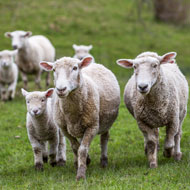Timing of insecticide use ‘crucial’ for disease control

Adult female midges are responsible for infecting livestock with a number of diseases.
UK ecologists say the timing of insecticide treatments could be the key to controlling midges that spread livestock diseases including bluetongue and Schmallenberg virus (SBV).
A new scientific model suggests concentrating treatments during the midge peak in spring could actually increase midge abundance later in the year. This is down to a density-dependence release effect, whereby removing adults reduces the over-compensatory larval competition and increases larval survival, leading to greater adult abundance.
Timing treatments in the autumn midge peak has the greatest effect in suppressing populations, according to a research team led by the Centre for Ecology & Hydrology (CEH). Their findings have been published in the Parasite & Vectors journal.
Adult female midges are responsible for infecting livestock with a number of diseases. Midges are active between spring and autumn but their activity period varies across the UK and Europe. The severity of disease is linked to the number of midges at peak season.
Dr Steven White, a theoretical ecologist at CEH, commented: “Most studies only consider the months where midges are active, since the peak abundances are closely linked to the severity of disease. However, our study suggests that non-active periods are also key.”
Essential movements of animals between premises and vaccination campaigns can only be carried out in the EU within the ‘seasonal free vector period’ during winter, when adult midges are absent or less active and don’t bite animals.
Dr Bethan Purse, a disease ecologist at CEH, explained: “Being able to predict when and where the midges are actively biting livestock is invaluable for calculating the vector-free period in which livestock can be safely vaccinated and moved between premises.”
The research team believes scientific models can help to produce seasonal patterns of midges so control measures can be tailored to midge activity. More extensive modelling of Culicoides biting midges in different countries could improve control methods and help to predict potential disease outbreaks.



 The BSAVA has opened submissions for the BSAVA Clinical Research Abstracts 2026.
The BSAVA has opened submissions for the BSAVA Clinical Research Abstracts 2026.